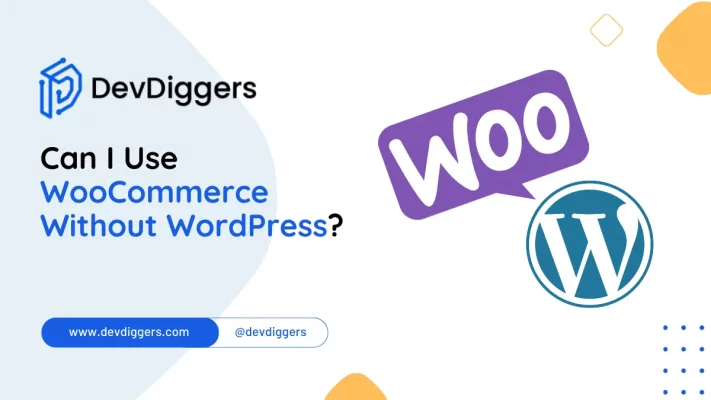- What is WooCommerce?
- How do WordPress and WooCommerce Work Together?
- Is It Possible to Use WooCommerce Without WordPress?
- Limitations and Challenges of Using WooCommerce Without WordPress
- Benefits of Using WooCommerce With WordPress
- Final Thoughts on WooCommerce Without WordPress
- FAQs About WooCommerce Without WordPress
Can I Use WooCommerce Without WordPress?

- What is WooCommerce?
- How do WordPress and WooCommerce Work Together?
- Is It Possible to Use WooCommerce Without WordPress?
- Limitations and Challenges of Using WooCommerce Without WordPress
- Benefits of Using WooCommerce With WordPress
- Final Thoughts on WooCommerce Without WordPress
- FAQs About WooCommerce Without WordPress
WooCommerce and WordPress are usually seen as a powerful team exploring the world of online stores.
But here’s the question: can I use WooCommerce without WordPress? In this blog, we’re digging into this idea.
We’ll look at the good and not-so-good sides and see whether businesses can make the most of WooCommerce without being tied to WordPress.
Join us on this journey, where we discuss whether it is possible to use WooCommerce without WordPress in the constantly changing world of online shopping.
What is WooCommerce?

WooCommerce is like your online selling sidekick, perfect for those just stepping into digital sales. It’s not just any tool; it’s a plugin connected to WordPress, a famous website platform.
Created by WooThemes, this super tool turns your regular WordPress site into a lively online store. Imagine it as a computerized assistant for selling items online.
With WooCommerce plugins, you can effortlessly manage your products, ensure that customers can pay you securely, keep track of how many goods you have for sale, and even customize the appearance of your online store.
It’s simple to use, and whether you have a small business just getting started or a large one expanding online, WooCommerce is here to make your digital selling journey as effortless and adaptable as it should be!
How do WordPress and WooCommerce Work Together?
WordPress is a user-friendly Content Management System (CMS) that provides the groundwork for websites with flexible themes and templates. WooCommerce is an eCommerce plugin that integrates smoothly with WordPress.
This extension enhances the WordPress dashboard with tools for managing products and orders and customizing the style and functioning of the online store.
WooCommerce extensions allow you to create and manage product pages, including images, descriptions, and dynamic pricing.
It contains a built-in shopping cart and secure checkout and supports a variety of payment channels for a more efficient purchasing procedure.
Extensive customization is possible with extra plugins to improve elements like SEO, security, and performance.
WordPress and WooCommerce require regular updates to ensure maximum functioning and security. In conclusion, this combination creates a strong and flexible platform.
Is It Possible to Use WooCommerce Without WordPress?
No, it is not possible to use WooCommerce without WordPress.
WooCommerce has a strong connection with the WordPress platform and cannot be utilized separately.
With the help of a WooCommerce plugin, a WordPress website may be extended to become a fully functional online store.
Through the use of WooCommerce’s eCommerce features and WordPress’s content management features, this connection guarantees a smooth user experience.
Consequently, to take advantage of WooCommerce, you must first have a working WordPress website.
After that, you must install the WooCommerce plugin to access and use all the eCommerce features, such as online store functionality, product management, and secure checkout processes.
Limitations and Challenges of Using WooCommerce Without WordPress

The collaboration between WooCommerce and WordPress provides a robust basis for enterprises and people wishing to develop and manage online storefronts.
A well-known eCommerce plugin made exclusively for WordPress is called WooCommerce. However, there are several limitations and challenges when using WooCommerce without WordPress:
- Lack of Integration: WooCommerce utilizes WordPress’s capabilities and functionalities and is closely integrated with it. When WordPress isn’t used, you lose out on seamless content management system (CMS) integration, which may affect how well you manage and present your products.
- Limited Content Management: Thanks to WordPress’s sophisticated content management features, users may quickly create and organize material. You can only use these CMS functions with WordPress, which makes it challenging to develop informative content and rich product sites.
- Reduced Customization Options: You can customize the look and feel of your online store using a variety of WordPress themes and plugins. If you utilize WooCommerce without WordPress, there are fewer customization options available, which could result in a less personalized and distinctive storefront.
- SEO Difficulties: WooCommerce benefits from WordPress’s well-known SEO-friendly framework. You might have trouble search engine optimizing your online store without WordPress, which could have an impact on how visible and highly ranked you are in search results.
- Security Issues: A large user base continually develops security upgrades and solutions for WordPress. If you use WooCommerce without WordPress, you might not be able to take advantage of the security precautions within the larger WordPress community, which could expose your online store to attacks.
- Updates and Compatibility: WooCommerce upgrades are frequently coordinated with WordPress updates to ensure compatibility. Maintaining WooCommerce’s compatibility with other third-party products or services and keeping it up to date without WordPress could be challenging.
- Community Support: Many developers, designers, and users who participate in forums and support channels make up WordPress’s community. When using WooCommerce without WordPress, you may have restricted access to this community help, making it challenging to find solutions to issues or seek guidance.
- Scalability Concerns: WordPress is renowned for being scalable, enabling websites to expand as required. You may find it challenging to scale your online business effectively without WordPress, particularly if you intend to grow and add additional features or products.
To get over these limitations, start using WordPress with WooCommerce. You must follow some simple steps to set up WooCommerce on WordPress to do this.
Benefits of Using WooCommerce With WordPress

- Integrated Platform: WooCommerce and WordPress combine smoothly to offer a single platform for eCommerce and content management. Overall, website management is made simpler by this integration.
- User-Friendly Interface: The user-friendly interfaces of WordPress and WooCommerce are similar. Because of this, website owners don’t need much technical knowledge to operate and navigate their online business.
- Ecommerce and Content Harmony: The integration makes it possible for eCommerce and content to coexist together. The smooth coexistence of product pages with blog posts and other website content results in a seamless user experience.
- Extensive Customization: Businesses may modify their online stores to a great extent with WordPress, thanks to its broad range of themes and plugins. This adaptability guarantees that the store fits the unique requirements and identity of the brand.
- Safe and Reliable Transactions: WooCommerce ensures safe and dependable transactions by integrating multiple secure payment methods. WordPress’s robust security features further enhance a secure environment for content and transactions.
- SEO Optimization: WooCommerce carries over WordPress’s well-known SEO-friendly architecture. Effective SEO optimization for blog posts, product pages, and the entire content of websites is made possible by this connection.
- Scalability: WooCommerce and WordPress offer a scalable solution as your business expands. The platform easily handles growth, whether expanding your content or adding new goods.
- Rich Analytics: WooCommerce has built-in analytics capabilities that provide sales, consumer behavior, and inventory information. Companies can see the whole picture of their online performance using WordPress analytics plugins.
- Cost-effective Solution: WordPress is an open-source platform, and WooCommerce is a free plugin. Because of this, the combination is an affordable option for companies, particularly those just getting started and with limited financial resources.
- Mobile Responsiveness: WooCommerce and WordPress place a high priority on mobile responsiveness because mobile devices account for the majority of web traffic. This combination allows for the creation of online stores that are designed for a smooth mobile browsing experience.
Utilizing WooCommerce with WordPress offers businesses looking to create and grow their online presence a comprehensive and effective option.
Many eCommerce initiatives choose the partnership because it provides the ideal balance of functionality, customization, and user-friendly features.
Final Thoughts on WooCommerce Without WordPress
In a nutshell, it is not possible to use WooCommerce without WordPress. They support one another and work well together as a dynamic team for anyone looking to open an online store.
WooCommerce depends on WordPress’s core and content management features. WordPress maintains the website, while WooCommerce offers the unique functionality required for an online store.
It’s like having a trustworthy staff working for you. Thus, if you’re considering opening an online store, remember that a good and integrated experience depends heavily on WooCommerce and WordPress working together.
If you were to utilize WooCommerce without WordPress, you would lose out on the crucial collaboration that facilitates an easy and effective way to manage your website and online store.
FAQs About WooCommerce Without WordPress
Why does WooCommerce require WordPress?
WooCommerce is intricately connected to WordPress to use its features, security, and content management system, providing a seamless online selling experience.
What are the benefits of using WordPress with WooCommerce?
Many online businesses use WordPress because of its user-friendly interface, large plugin library, and extensive community. WooCommerce integration with WordPress further enhances these advantages.
Are there limitations to using WooCommerce without WordPress?
Since WooCommerce is designed to work within the WordPress ecosystem, attempting to use it separately would result in compatibility issues and functionality constraints.
Is WooCommerce exclusive to WordPress?
Yes, WooCommerce is built explicitly for integration with WordPress and utilizes its infrastructure.
Is there an alternative to WooCommerce for non-WordPress websites?
Yes, several eCommerce platforms are available for websites not built on WordPress. Consider options like Shopify, Magento, or OpenCart.

Kartika Musle
A Tech enthusiast and skilled wordsmith. Explore the digital world with insightful content and unlock the latest in tech through my vision.

Leave a Reply